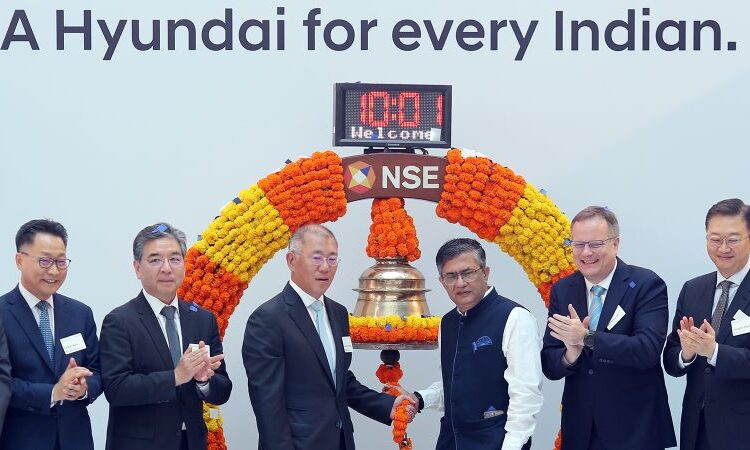
Reuters
—
Shares of Hyundai Motor India dropped as much as 6% in their market debut on Tuesday, after a tepid response from retail investors to the pricing of the country’s largest ever initial public offering.
The stock listed at 1,934 rupees ($23) on India’s National Stock Exchange, below its offer price of 1,960 rupees ($23.31), and traded down 4% at 1,882.10 rupees ($22.39) by 0548 GMT (1:48 a.m. ET), giving the company a valuation of 1.53 trillion rupees ($18.2 billion).
Hyundai, India’s No. 2 carmaker with a market share of 15%, was targeting a valuation of $19 billion through the IPO.
Its record $3.3 billion IPO was oversubscribed more than two-fold last week, led largely by institutional investors, but pricing concerns deterred retail investors who worried they would not be able to make gains on the listing.
Shares of Indian rivals have also slipped in recent weeks as car sales slow after two years of record highs, with customers delaying purchases on worries about stubborn inflation.
“Hyundai’s issue has been stiffly priced and that seems to be weighing down on its listing as well,” said Arun Kejriwal, founder of Kejriwal Research.
“Besides, the volumes seen so far are driven only by institutional investors, and is rather poor for an IPO of Hyundai’s size.”
Tuesday’s listing in Mumbai is Hyundai Motor’s first debut outside its home market of South Korea and comes at a time when India’s equity markets have risen sharply.
With competition from domestic rivals Tata Motors and Mahindra & Mahindra, Hyundai Motor plans to use proceeds from its sale of a stake of 17.5% in the Indian unit to invest in research and launch new products.
“Hyundai Motor will play a crucial role in Hyundai Motor India’s long-term growth through our collaboration in R&D, design, manufacturing,” the Korean automaker’s CEO, Jaehoon Chang, said at a listing ceremony in Mumbai.
Seven of India’s 10 largest IPOs, including Hyundai India, reported listing day losses ranging from 5% to 27%, according to data from Dealogic.
While Hyundai’s market valuation is much smaller than Indian market leader Maruti Suzuki’s $45 billion, analysts have expressed concerns over the narrower gap in their price-to-earnings (P/E) ratios.
The issue had valued Hyundai at 26 times its fiscal 2024 earnings, not far off the multiple of 29 for Maruti.
Some major brokerages, however, see long-term value in the stock.
Nomura started coverage of Hyundai with a “buy” rating and price target of 2,472 rupees ($29.40). The brokerage said it liked Hyundai’s high concentration of SUVs in the portfolio, which accounted for 67% of sales in the April-to-June 2024 quarter.
Similarly, Macquarie analysts began coverage with an “outperform” rating and price target of 2,235 rupees ($26.58), saying Hyundai’s SUV-centric portfolio commanded a P/E premium.
“We shall leverage our deep understanding of consumer preferences to successfully expand our passenger vehicle portfolio,” Hyundai India’s chief operating officer Tarun Garg said at the listing ceremony.
Shares of Maruti and Tata Motors were down 1%, in line with the Nifty Auto index

